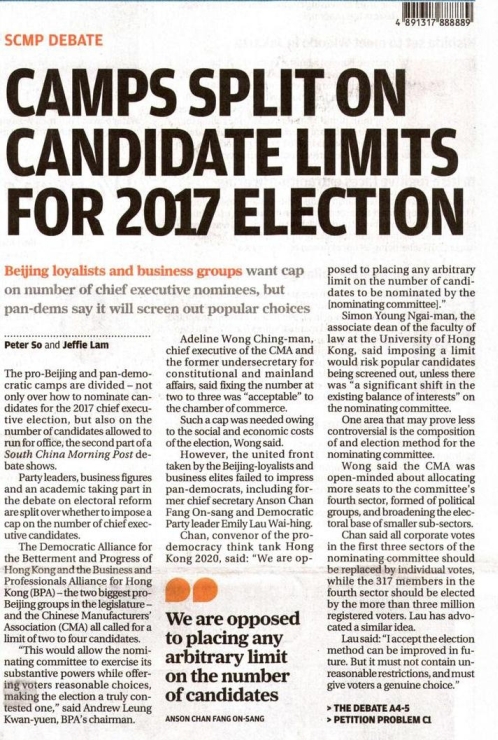Beijing loyalists and business groups want cap on number of chief executive nominees, but pan-dems say it will screen out popular choices.
The pro-Beijing and pan-democratic camps are divided – not only over how to nominate candidates for the 2017 chief executive election, but also on the number of candidates allowed to run for office, the second part of a South China Morning Post debate shows.
Party leaders, business figures and an academic taking part in the debate on electoral reform are split overwhether to impose a cap on the number of chief executive candidates.
The Democratic Alliance for the Betterment and Progress of Hong Kong and the Business and Professionals Alliance for Hong Kong (BPA) – the two biggest pro-Beijing groups in the legislature – and the Chinese Manufacturers’ Association (CMA) all called for a limit of two to four candidates.
“This would allow the nominating committee to exercise its substantive powers while offering voters reasonable choices, making the election a truly contested one,” said Andrew Leung Kwan-yuen, BPA’s chairman.
Adeline Wong Ching-man, chief executive of the CMA and the former undersecretary for constitutional and mainland affairs, said fixing the number at two to three was “acceptable” to the chamber of commerce.
Such a cap was needed owing to the social and economic costs of the election, Wong said.
However, the united front taken by the Beijing-loyalists and business elites failed to impress pan-democrats, including former chief secretary Anson Chan Fang On-sang and Democratic Party leader Emily Lau Wai-hing.
Chan, convenor of the pro-democracy think tank Hong Kong 2020, said: “We are opposed to placing any arbitrary limit on the number of candidates to be nominated by the [nominating committee].”
Simon Young Ngai-man, the associate dean of the faculty of law at the University of Hong Kong, said imposing a limit would risk popular candidates being screened out, unless there was “a significant shift in the existing balance of interests” on the nominating committee.
One area that may prove less controversial is the composition and election method for the nominating committee. Wong said the CMA was open-minded about allocating more seats to the committee’s fourth sector, formed of political groups, and broadening the electoral base of smaller sub-sectors.
Chan said all corporate votes in the first three sectors of the nominating committee should be replaced by individual votes, while the 317 members in the fourth sector should be elected by the more than three million registered voters. Lau has advocated a similar idea.
Lau said: “I accept the election method can be improved in future. But it must not contain unreasonable restrictions, and must give voters a genuine choice.”
(2014-08-11, SCMP)


 Follow
Follow